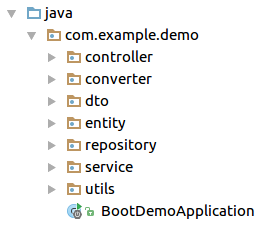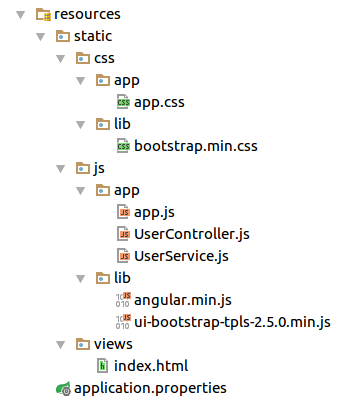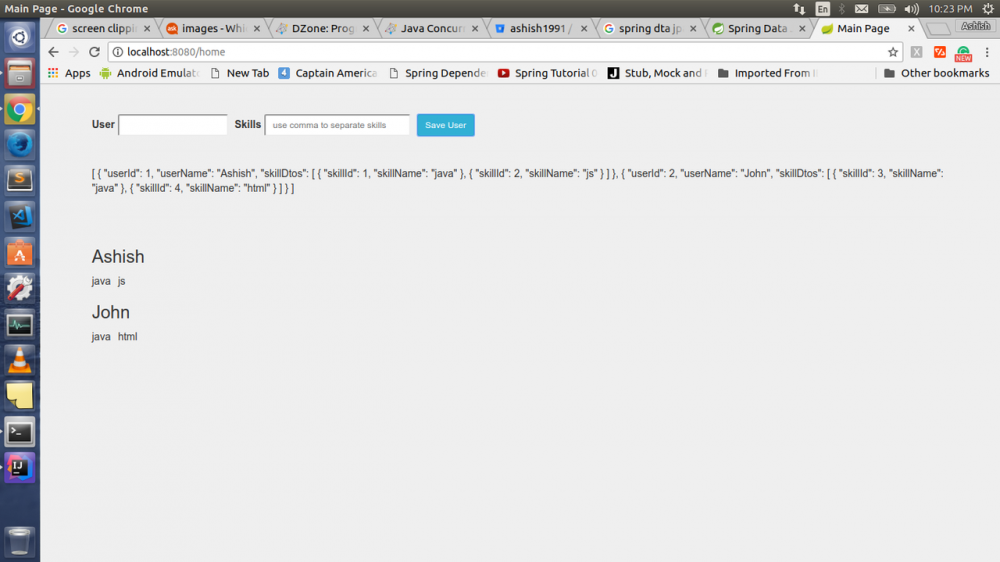使用Java 8,Spring Boot和Angular创建简单的Web应用程序
入门条件
· Java 8已安装。
· 任何Java IDE(最好是STS或IntelliJ IDEA)。
· 使用HTML,CSS和JavaScript,基本了解基于Java和Spring的Web开发和UI开发。
背景
在本文中,我将尝试使用Java 8和Spring Boot创建一个小型端到端Web应用程序。
我选择了SpringBoot,因为它更容易配置并且可以很好地与其他技术堆栈配合使用。我还使用了REST API和SpringData JPA以及H2数据库。
我使用 Spring Initializer 添加所有依赖项,并使用我的所有配置创建一个空白的工作项目。
我使用Maven作为构建工具,但也可以使用Gradle。
pom.xml
<?xml version="1.0"
encoding="UTF-8"?>
<project xmlns="http://maven.apache.org/POM/4.0.0" xmlns:xsi="http://www.w3.org/2001/XMLSchema-instance" xsi:schemaLocation="http://maven.apache.org/POM/4.0.0
http://maven.apache.org/xsd/maven-4.0.0.xsd">
<modelVersion>4.0.0</modelVersion>
<groupId>com.example</groupId>
<artifactId>bootdemo</artifactId>
<version>0.0.1-SNAPSHOT</version>
<packaging>jar</packaging>
<name>bootDemo</name>
<description>Demo project for Spring Boot</description>
<parent>
<groupId>org.springframework.boot</groupId>
<artifactId>spring-boot-starter-parent</artifactId>
<version>1.5.3.RELEASE</version>
<relativePath />
<!-- lookup parent from repository
-->
</parent>
<properties>
<project.build.sourceEncoding>UTF-8</project.build.sourceEncoding>
<project.reporting.outputEncoding>UTF-8</project.reporting.outputEncoding>
<java.version>1.8</java.version>
</properties>
<dependencies>
<dependency>
<groupId>org.springframework.boot</groupId>
<artifactId>spring-boot-starter-data-jpa</artifactId>
</dependency>
<dependency>
<groupId>org.springframework.boot</groupId>
<artifactId>spring-boot-devtools</artifactId>
</dependency>
<dependency>
<groupId>org.springframework.boot</groupId>
<artifactId>spring-boot-starter-data-rest</artifactId>
</dependency>
<dependency>
<groupId>org.springframework.boot</groupId>
<artifactId>spring-boot-starter-web</artifactId>
</dependency>
<dependency>
<groupId>com.h2database</groupId>
<artifactId>h2</artifactId>
<scope>runtime</scope>
</dependency>
<dependency>
<groupId>org.springframework.boot</groupId>
<artifactId>spring-boot-starter-test</artifactId>
<scope>test</scope>
</dependency>
<dependency>
<groupId>org.springframework.restdocs</groupId>
<artifactId>spring-restdocs-mockmvc</artifactId>
<scope>test</scope>
</dependency>
</dependencies>
<build>
<plugins>
<plugin>
<groupId>org.springframework.boot</groupId>
<artifactId>spring-boot-maven-plugin</artifactId>
</plugin>
</plugins>
</build>
</project>复制代码
复制代码
在UI部分,我使用了AngularJS和BootStrap CSS以及基本的JS,CSS和HTML。
这是一个非常简单的可用于创建Web应用程序的项目,。
结构


实施
让我们从SpringBootApplication类开始。
@SpringBootApplication
public class BootDemoApplication {
@Autowired
UserRepository userRepository;
public static void main(String[] args) {
SpringApplication.run(BootDemoApplication.class, args);
}
}复制代码
我们现在创建Controller。
@Controller
public class HomeController {
@RequestMapping("/home")
public String home() {
return "index";
}
}复制代码
这将作为我们SPA的主页。现在我们创建一个Controller来处理一些REST调用。
@RequestMapping("/user")
@RestController
public class UserController {
@Autowired
UserService
userService;
@RequestMapping(Constants.GET_USER_BY_ID)
public UserDto getUserById(@PathVariable Integer userId) {
return userService.getUserById(userId);
}
@RequestMapping(Constants.GET_ALL_USERS)
public List < UserDto > getAllUsers() {
return userService.getAllUsers();
}
@RequestMapping(value = Constants.SAVE_USER, method =
RequestMethod.POST)
public void saveUser(@RequestBody UserDto userDto) {
userService.saveUser(userDto);
}
}复制代码
在这里,我们有不同的方法来处理来自客户端的不同测试调用。
我在Controller中安装了一个Service类 UserService 。
public interface UserService {
UserDto
getUserById(Integer userId);
void saveUser(UserDto userDto);
List < UserDto
> getAllUsers();
}
@Service
public class UserServiceimpl implements
UserService {
@Autowired
UserRepository
userRepository;
@Override
public UserDto getUserById(Integer userId) {
return
UserConverter.entityToDto(userRepository.getOne(userId));
}
@Override
public void saveUser(UserDto userDto) {
userRepository.save(UserConverter.dtoToEntity(userDto));
}
@Override
public List < UserDto > getAllUsers() {
return
userRepository.findAll().stream().map(UserConverter::entityToDto).collect(Collectors.toList());
}
}复制代码
在典型的Web应用程序中,通常有两种类型的数据对象:DTO(通过客户端进行通信)和实体(通过DB进行通信)。
DTO
public class UserDto {
Integer userId;
String userName;
List<SkillDto> skillDtos= new ArrayList<>();
public UserDto(Integer userId, String userName, List<SkillDto> skillDtos) {
this.userId = userId;
this.userName = userName;
this.skillDtos = skillDtos;
}
public UserDto() {
}
public Integer getUserId() {
return userId;
}
public void setUserId(Integer userId) {
this.userId = userId;
}
public String getUserName() {
return userName;
}
public void setUserName(String userName) {
this.userName = userName;
}
public List<SkillDto> getSkillDtos() {
return skillDtos;
}
public void setSkillDtos(List<SkillDto> skillDtos) {
this.skillDtos = skillDtos;
}
}
public class SkillDto {
Integer skillId;
String SkillName;
public SkillDto(Integer skillId, String skillName) {
this.skillId = skillId;
SkillName =
skillName;
}
public SkillDto() {
}
public Integer getSkillId() {
return skillId;
}
public void setSkillId(Integer skillId) {
this.skillId = skillId;
}
public String getSkillName() {
return SkillName;
}
public void setSkillName(String skillName) {
SkillName =
skillName;
}
}复制代码
Entity
@Entity
public class User implements Serializable{
private static final long serialVersionUID = 0x62A6DA99AABDA8A8L;
@Column
@GeneratedValue(strategy = GenerationType.AUTO)
@Id
private Integer userId;
@Column
private String userName;
@OneToMany(cascade = CascadeType.ALL, fetch =
FetchType.EAGER)
private List<Skill> skills= new LinkedList<>();
public Integer getUserId() {
return userId;
}
public void setUserId(Integer userId) {
this.userId = userId;
}
public String getUserName() {
return userName;
}
public void setUserName(String userName) {
this.userName = userName;
}
public List<Skill> getSkills() {
return skills;
}
public void setSkills(List<Skill> skills) {
this.skills = skills;
}
public User() {
}
public User(String userName, List<Skill> skills) {
this.userName = userName;
this.skills = skills;
}
}
@Entity
public class Skill {
@Column
@GeneratedValue(strategy = GenerationType.AUTO)
@Id
private Integer skillId;
@Column
private String skillName;
@ManyToOne
private User user;
public Skill(String skillName) {
this.skillName = skillName;
}
public Integer getSkillId() {
return skillId;
}
public void setSkillId(Integer skillId) {
this.skillId = skillId;
}
public String getSkillName() {
return skillName;
}
public void setSkillName(String skillName) {
this.skillName = skillName;
}
public User getUser() {
return user;
}
public void setUser(User user) {
this.user = user;
}
public Skill() {
}
public Skill(String skillName, User user) {
this.skillName = skillName;
this.user = user;
}
}复制代码
对于数据库操作,我们使用SpringData JPA:
@Repository
public interface UserRepository extends
JpaRepository<User, Integer>{
}
@Repository
public interface SkillRepository extends
JpaRepository<Skill, Integer>{
}复制代码
在默认情况下,扩展 JpaRepository 提供了大量的CRUD操作,也可以使用它来创建自己的查询方法。
为了转换DTO - >Entity和Entity - > DTO,我创建了一些基本的转换器类。
public class UserConverter {
public static User dtoToEntity(UserDto userDto) {
User user = new User(userDto.getUserName(), null);
user.setUserId(userDto.getUserId());
user.setSkills(userDto.getSkillDtos().stream().map(SkillConverter::dtoToEntity).collect(Collectors.toList()));
return user;
}
public static UserDto entityToDto(User user) {
UserDto userDto =
new UserDto(user.getUserId(),
user.getUserName(), null);
userDto.setSkillDtos(user.getSkills().stream().map(SkillConverter::entityToDto).collect(Collectors.toList()));
return userDto;
}
}
public class SkillConverter {
public static Skill dtoToEntity(SkillDto SkillDto) {
Skill Skill = new Skill(SkillDto.getSkillName(), null);
Skill.setSkillId(SkillDto.getSkillId());
return Skill;
}
public static SkillDto entityToDto(Skill skill) {
return new SkillDto(skill.getSkillId(), skill.getSkillName());
}
}复制代码
现在让我们关注UI部分。
使用Angular时,我们需要遵循一些指导原则。
index.html
<!DOCTYPE html>
<html>
<head>
<meta charset="ISO-8859-1">
<title>Main Page</title>
</head>
<body ng-app="demo">
<hr/>
<div class="container" ng-controller="UserController">
<div class="row">
<label>User</label> <input type="text" ng-model="userDto.userName" class="input-sm
spacing"/>
<label>Skills</label> <input type="text" ng-model="skills" ng-list class="input-sm custom-width spacing"
placeholder="use comma to separate skills"/>
<button ng-click="saveUser()" class="btn btn-sm
btn-info">Save User</button>
</div>
<hr/>
<div class="row">
<p>{{allUsers | json}}</p>
</div>
<hr/>
<div class="row" ng-repeat="user in
allUsers">
<div class="">
<h3>{{user.userName}}</h3>
<span ng-repeat="skill in
user.skillDtos" class="spacing">{{skill.skillName}}</span>
</div>
</div>
</div>
</body>
<script src="js/lib/angular.min.js"></script>
<script src="js/lib/ui-bootstrap-tpls-2.5.0.min.js"></script>
<script src="js/app/app.js"></script>
<script src="js/app/UserController.js"></script>
<script src="js/app/UserService.js"></script>
<link rel="stylesheet" href="css/lib/bootstrap.min.css"/>
<link rel="stylesheet" href="css/app/app.css"/>
</html>复制代码
在创建HTML时,不要忘记导入所需的JS和CSS文件。

app.js
'use strict'
var demoApp = angular.module('demo', ['ui.bootstrap', 'demo.controllers',
'demo.services'
]);
demoApp.constant("CONSTANTS", {
getUserByIdUrl:
"/user/getUser/",
getAllUsers: "/user/getAllUsers",
saveUser: "/user/saveUser"
});复制代码
UserController.js
'use strict'
var module = angular.module('demo.controllers', []);
module.controller("UserController", ["$scope", "UserService",
function($scope, UserService) {
$scope.userDto = {
userId:
null,
userName: null,
skillDtos: []
};
$scope.skills = [];
UserService.getUserById(1).then(function(value) {
console.log(value.data);
}, function(reason) {
console.log("error
occured");
}, function(value) {
console.log("no
callback");
});
$scope.saveUser = function() {
$scope.userDto.skillDtos = $scope.skills.map(skill => {
return {
skillId: null,
skillName: skill
};
});
UserService.saveUser($scope.userDto).then(function() {
console.log("works");
UserService.getAllUsers().then(function(value) {
$scope.allUsers = value.data;
}, function(reason) {
console.log("error
occured");
}, function(value) {
console.log("no
callback");
});
$scope.skills = [];
$scope.userDto = {
userId: null,
userName: null,
skillDtos: []
};
}, function(reason) {
console.log("error
occured");
}, function(value) {
console.log("no
callback");
});
}
}
]);复制代码
UserService.js
'use strict'
angular.module('demo.services', []).factory('UserService', ["$http", "CONSTANTS", function($http, CONSTANTS) {
var service = {};
service.getUserById = function(userId) {
var url = CONSTANTS.getUserByIdUrl + userId;
return $http.get(url);
}
service.getAllUsers = function() {
return $http.get(CONSTANTS.getAllUsers);
}
service.saveUser = function(userDto) {
return $http.post(CONSTANTS.saveUser, userDto);
}
return service;
}]);复制代码
app.css
body{
background-color: #efefef;
}
span.spacing{
margin-right: 10px;
}
input.custom-width{
width: 200px;
}
input.spacing{
margin-right: 5px;
}复制代码
可以使用以下方法构建应用程序
mvn clean install 或者 java -jar bootdemo-0.0.1-SNAPSHOT.jar
打开浏览器并点击 http:// localhost:8080 / home
在打开一个简单的页面之后,输入名称和技能,输入的数据将保留在数据库中。

本人创业团队产品MadPecker,主要做BUG管理、测试管理、应用分发,网址:www.madpecker.com,有需要的朋友欢迎试用、体验!
本文为MadPecker团队技术人员编写,转载请标明出处
- 本文标签: JPA cat Spring Boot 管理 list tab lib 创业 Service UI App ArrayList spring final ip ACE 产品 id CSS value 测试 build tar JavaScript 配置 CTO LinkedList 开发 pom http 数据库 IO Bootstrap XML web example neToMany 安装 代码 bug dependencies maven entity description plugin IDE json stream apache schema js ManyToOne map springboot API REST db src find constant 数据 HTML zab java AngularJS https
- 版权声明: 本文为互联网转载文章,出处已在文章中说明(部分除外)。如果侵权,请联系本站长删除,谢谢。
- 本文海报: 生成海报一 生成海报二











![[HBLOG]公众号](https://www.liuhaihua.cn/img/qrcode_gzh.jpg)

